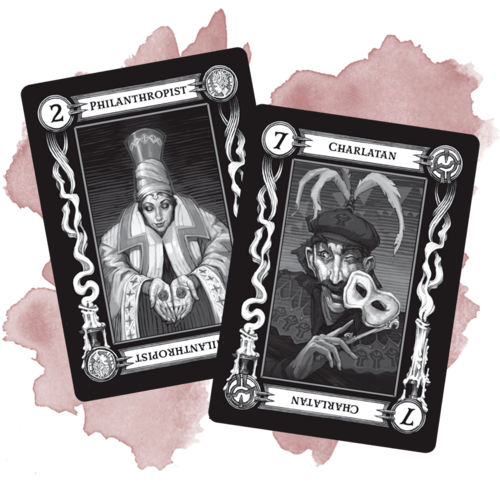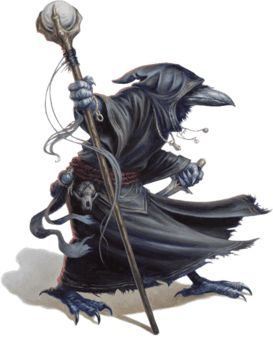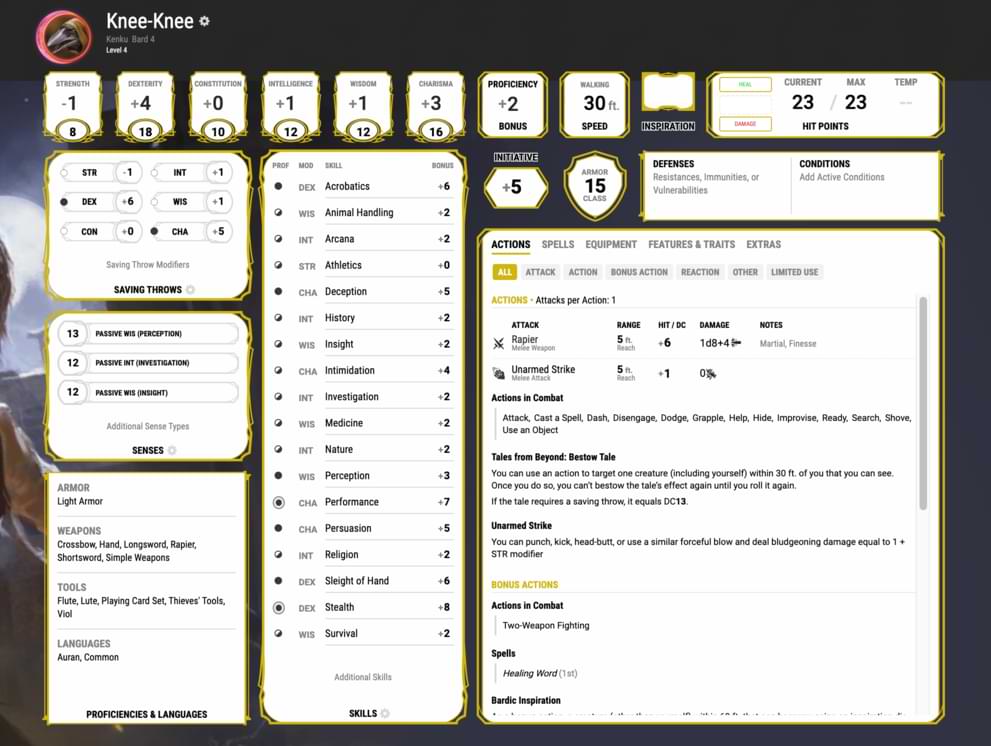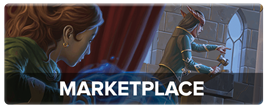Imagine a bard reaching for their instrument, seemingly about to buff a party member. Suddenly, an unnatural, dissonant melody echoes across the battlefield as the bard supports their comrade not with an inspiring tune, but via a chilling aria that speaks of long-dead specters!
Bards in the College of Spirits, a subclass introduced in Van Richten’s Guide to Ravenloft, are like leaders of a séance, weaving tales of creatures who have long since past from the Material Plane. When these singers open their mouths, spirits speak through them.
College of Spirits features
- Guiding Whispers: At 3rd level, when you join this college, you learn the Guidance cantrip and can cast it at a range of up to 60 feet. This increased range permits you to aid party members in situations you otherwise might be unable to, such as if they are scaling a cliff or are onstage putting on a performance. You can flavor this cantrip as you summoning a spirit to lend a hand.
- Spiritual Focus: You also receive a Spiritual Focus at 3rd level. This focus can take the form of a candle, crystal ball, ouija board, deck of tarokka cards, or a skull. The focus just adds flavor to this subclass until 6th level. At that level, when you cast a bard spell that deals damage or restores hit points through your Spiritual Focus, you can roll a d6 and add it to one roll of the spell.
- Tales from Beyond: The College of Spirits' bread and butter is the 3rd-level feature Tales from Beyond. As a bonus action, you can spend a Bardic Inspiration die to roll on the Spirit Tales table (shown below). Each tale has a different effect, ranging from teleporting targets to dealing psychic damage to enemies. You can retain one tale at a time and only until you either use the effect or finish a short or long rest. Using an action, you can bestow the tale’s effect on a target within 30 feet, including yourself. The tales are also prefaced with flavorful hooks that make for great roleplaying fuel. For instance, the psychic damage effect occurs when the bard orates a fable of an incomprehensible, mind-bending being. Perhaps the bard has communed with the deceased follower of an eldritch god from beyond the stars like Cthulhu!
Spirit Tales
| Tale Told Through You | Bardic Insp. Die |
| 1 | Tale of the Clever Animal. For the next 10 minutes, whenever the target makes an Intelligence, a Wisdom, or a Charisma check, the target can roll an extra die immediately after rolling the d20 and add the extra die’s number to the check. The extra die is the same type as your Bardic Inspiration die. |
| 2 | Tale of the Renowned Duelist. You make a melee spell attack against the target. On a hit, the target takes force damage equal to two rolls of your Bardic Inspiration die + your Charisma modifier. |
| 3 | Tale of the Beloved Friends. The target and another creature of its choice it can see within 5 feet of it gains temporary hit points equal to a roll of your Bardic Inspiration die + your Charisma modifier. |
| 4 | Tale of the Runaway. The target can immediately use its reaction to teleport up to 30 feet to an unoccupied space it can see. When the target teleports, it can choose a number of creatures it can see within 30 feet of it up to your Charisma modifier (minimum of 0) to immediately use the same reaction. |
| 5 | Tale of the Avenger. For 1 minute, any creature that hits the target with a melee attack takes force damage equal to a roll of your Bardic Inspiration die. |
| 6 | Tale of the Traveler. The target gains temporary hit points equal to a roll of your Bardic Inspiration die + your bard level. While it has these temporary hit points, the target’s walking speed increases by 10 feet and it gains a +1 bonus to its AC. |
| 7 | Tale of the Beguiler. The target must succeed on a Wisdom saving throw or take psychic damage equal to two rolls of your Bardic Inspiration die, and the target is incapacitated until the end of its next turn. |
| 8 | Tale of the Phantom. The target becomes invisible until the end of its next turn or until it hits a creature with an attack. If the target hits a creature with an attack during this invisibility, the creature it hits takes necrotic damage equal to a roll of your Bardic Inspiration die and is frightened of the target until the end of the frightened creature’s next turn. |
| 9 | Tale of the Brute. Each creature of the target’s choice it can see within 30 feet of it must make a Strength saving throw. On a failed save, a creature takes thunder damage equal to three rolls of your Bardic Inspiration die and is knocked prone. A creature that succeeds on its saving throw takes half as much damage and isn’t knocked prone. |
| 10 | Tale of the Dragon. The target spews fire from the mouth in a 30-foot cone. Each creature in that area must make a Dexterity saving throw, taking fire damage equal to four rolls of your Bardic Inspiration die on a failed save, or half as much damage on a successful one. |
| 11 | Tale of the Angel. The target regains hit points equal to two rolls of your Bardic Inspiration die + your Charisma modifier, and you end one condition from the following list affecting the target: blinded, deafened, paralyzed, petrified, or poisoned. |
| 12 | Tale of the Mind-Bender. You evoke an incomprehensible fable from an otherworldly being. The target must succeed on an Intelligence saving throw or take psychic damage equal to three rolls of your Bardic Inspiration die and be stunned until the end of its next turn. |
- Spirit Session: This 6th-level feature adds flexibility to the College of Spirits bard. Once per long rest, you can conduct an hour-long ritual with a number of creatures equal to your proficiency bonus (including yourself). Afterward, you temporarily learn a divination or necromancy spell from any class, and that spell counts as a bard spell. The spell level must be equal to the number of creatures who participated in the ritual, and be a spell level that you can cast. (Here is a complete list of spells you can learn.) The spell is retained until you take a long rest.
- Mystical Connection: At 14th level, College of Spirits bards gain more control over their Tales from Beyond. You can now roll a die twice when rolling on the Spirit Tales table, choosing which of the two effects to bestow. If you roll the same number twice, you can choose any effect!
Pros
 The College of Spirits offers much in the way of versatility and flavor, along with a healthy dose of randomness that will keep play interesting. Being able to cast Guidance at range is a fantastic means of supporting party members, and Tales from Beyond offers myriad opportunities for players to collaborate with their Dungeon Master on the appearance of a tale’s effect. For more flexibility, bards can even start the adventuring day by rolling on the Spirit Tales table and holding onto the rolled effect until they complete a short rest.
The College of Spirits offers much in the way of versatility and flavor, along with a healthy dose of randomness that will keep play interesting. Being able to cast Guidance at range is a fantastic means of supporting party members, and Tales from Beyond offers myriad opportunities for players to collaborate with their Dungeon Master on the appearance of a tale’s effect. For more flexibility, bards can even start the adventuring day by rolling on the Spirit Tales table and holding onto the rolled effect until they complete a short rest.
Spirit Session lets you access magic that you might otherwise skip when choosing spells. For instance, you can temporarily pick up spells such as Identify and Locate Object when it would benefit you. Your selection of spells that restore hit points is severely limited, but you do gain access to Revivify, which is a stellar option when you're anticipating combat.
Cons
Although Tales from Beyond has some great effects, the random nature of the Spirit Tales table might be off-putting to some players. The range of 30 feet could also require bards to wander closer to the fight in order to use each tale’s effect. Keep in mind, Bardic Inspiration has a range of 60 feet.
The big issue with the College of Spirits subclass, however, lies in the 6th-level Spiritual Focus feature. It specifies that you can only add a d6 to a spell that is cast through the focus. This means the spell must require material components. Spells such as Vicious Mockery and Healing Word won't benefit from this subclass feature as they only require verbal components.
Meet Knee-Knee, the Vistani-trained violinist
In the center of the misty forest crossroads was a campfire, bordered on all sides by brightly decorated wagons and dancing groups of traveling folk. These were the Vistani, and as they undulated their bodies to the tunes of lutes, tambourines, and violins, one figure seemed to stand out from the rest. Upon closer inspection, this figure wasn’t even human. It was a kenku, dressed in colorful Vistani garb, playing in sync with her companions.
Suddenly, the melody of the campfire took on a mysterious, dissonant tone. The kenku amplified this with several shrill vibrations of her violin strings, and as she did so, her pupils rolled backwards. A sinister voice emerged from her beak, telling the saga of a long-forgotten phantom. For a moment, it seemed as if this was no mere forest clearing, but a meeting ground for souls from the Ethereal Plane.
 Knee-Knee is a chaotic neutral kenku and former burglar who got her name from the scars on her knees, which she obtained after taking a nasty fall during a getaway. Her life of crime came to an end when she tried stealing an instrument from a group of traveling Vistani. She was caught, but to her surprise the travelers welcomed her into their group, remarking that she reminded them of wereravens.
Knee-Knee is a chaotic neutral kenku and former burglar who got her name from the scars on her knees, which she obtained after taking a nasty fall during a getaway. Her life of crime came to an end when she tried stealing an instrument from a group of traveling Vistani. She was caught, but to her surprise the travelers welcomed her into their group, remarking that she reminded them of wereravens.
Knee-Knee found that the group of Vistani were kind, and that her Mimicry made her a talented musician. Eventually, a Vistani bard gifted Knee-Knee the instrument she had sought to steal. They told her it was called a violin. Enamored by the instrument because it made a high-pitched sound that reminded her of her name, Knee-Knee could soon emulate dozens of tunes merely by observing others play the violin. She also learned tales from spirits that she and her newfound family encountered during trips into a realm known as the Shadowfell. Before long, Knee-Knee made it her goal to collect as many sounds and stories as possible — from both the living and the nonliving.
Playing Knee-Knee
Knee-Knee is a chaotic neutral bard with the Criminal background. Her highest ability scores are in Charisma and Dexterity, while her Strength is below average. She has proficiency and Expertise in the following skills:
- Acrobatics
- Deception
- Perception
- Performance (Expertise)
- Persuasion
- Sleight of Hand
- Stealth (Expertise)
Due to her Mimicry and fondness for sounds, Knee-Knee favors spells with verbal components, such as Message, Vicious Mockery, Dissonant Whispers, and Healing Word. Magic Mouth is also one of her personal favorites, since the kenku derives great delight from transmitting the sounds she collects from various inanimate objects.
The stories that Knee-Knee’s adoptive Vistani family tell her of Shadowfell ghosts can be used to flavor the College of Spirits' Tales from Beyond feature. Knee-Knee also has plenty of volunteers for her daily Spirit Session, allowing her to access circumstantial spells that can aid others. For spells requiring material components, Knee-Knee will use a Vistani tarokka deck as her Spiritual Focus.
Considering her relationship with the only group that navigates the Mists between the Shadowfell’s Domains of Dread, Knee-Knee can make for an excellent companion in any party.
Sing to the Mists
Knee-knee is but one example character you can build as a College of Spirits bard. If you’ve ever been drawn to the mournful sound of minor chords or dreamed of changing the tide of battle with nightmarish medleys, look no further than this subclass. Just be wary of the spirits that speak through you!
Van Richten's Guide to Ravenloft is available to purchase on D&D Beyond! It offers two new subclasses, lineages, all-new monsters, and more! Master-tier subscribers can share content they purchase in the marketplace with players in their campaigns.
Jeremy Blum (@PixelGrotto) is a journalist, gaming blogger, comic book aficionado, and fan of all forms of storytelling who rolled his first polyhedral dice while living in Hong Kong in 2017. Since then, he's never looked back and loves roleplaying games for the chance to tell the tales that have been swirling in his head since childhood.












-
View User Profile
-
Send Message
Posted May 26, 2021Now everyone can start dancing to Tiffany in celebration. Because they can now play as Klaus from the Umbrella Academy.
-
View User Profile
-
Send Message
Posted May 26, 2021Not only is there nothing that explicitly says that you can't use a spellcasting focus to cast spells that lack a material component, there is rules text which suggests you can.
The Spiritual Focus feature says, "You can use the following objects as a spellcasting focus for your bard spells [...]". Is healing word a bard spell? Yes it is. Therefore there's a reasonable argument to be made that, barring a rule that specifically says otherwise, you can use your spiritual focus for healing word, among other spells that lack a material component.
If we had only the text of the Spiritual Focus feature to go by, pretty much everybody would assume that the bard could cast all of their bard spells through the spiritual focus. Maybe since we've all been playing for years with a rule set where the only real benefit of using a spellcasting focus was to replace a material component (and to reduce item juggling when casting spells with an S, M components), that has biased us towards an interpretation that says that benefit is actually a requirement for using a spell focus. However, the text doesn't seem to actually support that interpretation very strongly.
Let's use clerics as an example to explore the rules. Here is all of the rules text we have in the Player's Handbook that's relevant to the question of whether a spell that lacks a material component can be cast through a cleric's holy symbol spellcasting focus:
So we have here rules text telling us what kind of spellcasting focus a cleric can use (holy symbol). We have text telling us what spells they can use it for (their cleric spells). We text describing how the cleric can use the holy symbol (by holding it hand, wearing it visibly, or bearing it on a shield). We have text describing a benefit of using a spellcasting focus (using it in place of a material component).
What we do not have is text saying, "the only way to use a spellcasting focus is to use it in place of a material component that a spell requires," or anything to that effect. As far as I can tell, that is purely an extrapolation, it's an interpretation which says that the rules governing material components imply a restriction on how a spellcasting focus can be used. I think that may be a valid interpretation, but that it is not the only valid interpretation, and it is an interpretation that contradicts the intent evident in the design of the Spiritual Focus feature.
This would mean that to use the feature you need a hand free to hold your focus (or have War Caster etc.) but it would mean you can still use it with spells that don't have material components.
The rules are ambiguous as to whether you would need to hold the spellcasting focus to use it, or how they can be used. The description of the holy symbol makes this explicit, but that is not the case for any other type of spellcasting focus. It is apparent though that the holy symbol is meant to be a special case in that it doesn't need to be held to be used, which implies that all other spellcasting focuses do need to be held, which is intuitive when it comes to a focus like a staff or a wand.
Assuming you do need to be holding a spiritual focus to use it, then to cast a spell with a somatic component but no material component, you would need to have a hand free in addition to the hand that's holding the spiritual focus, unless you have the War Caster feat and your other hand is holding a weapon or shield. That ruling is one that I don't think is required if you're going by the rules written in the Player's Handbook (the rule can be read literally and intuitively to have a different meaning), but it is apparently the intent, and the ruling was made official in the Sage Advice Compendium.
The rules for somatic/material components and their interactions with spellcasting focuses and spell component pouches are honestly a confusing and ambiguous mess and could do with a rewrite. They're unclear, and they are more fiddly than most of the system's other rules, and the fiddly aspect doesn't really have a payoff in terms of improving game balance, or making the game more fun. The best you can say is that some of the restrictions may improve verisimilitude, slightly.
And either I am wrong in my interpretation of these rules, and the designer/editors who worked on the College of Spirits also misunderstood the rules (or deliberately included a clause in feature which clause would apply to only a single [high-level] spell where the feature would be incidental), or evidently most other rules savvy players are wrong about spellcasting focuses only being usable for spells with M components. Either way, it suggests the rules are unclear and poorly presented.
Personally, I've adopted a raft of house rules to make the use of spell focuses less restrictive overall, and to clarify some points the rules are ambiguous on.
-
View User Profile
-
Send Message
Posted May 27, 2021If the spell does not have material components, and you have no other features that would change this, a focus can only replace material components, so if there are no material components, then the focus cannot be used.
-
View User Profile
-
Send Message
Posted May 27, 2021I understand that's the contention. There is no rule which explicitly supports that ruling, as far as I'm aware.
The rules for Spiritual Focus say that you can use the spiritual focus for your bard spells, with no qualifiers about material components or lack thereof.
The rules for material components say that you can use your spellcasting focus in place of a material component. You are interpreting that text as a requirement for using a spellcasting focus. I am interpreting it as an option that's available when using a spellcasting focus.
I feel my interpretation is more consistent with the wording of the rules for the Spiritual Focus feature, and the Spellcasting Focus feature that various classes get, and more consistent with the intent that's evident in the design of the Spiritual Focus feature. (And where there is ambiguity in the rules, we should probably consider designer intent, so far as it can be reasonably discerned.)
-
View User Profile
-
Send Message
Posted May 27, 2021Actually it doesn't really say that you can't:
Firstly it doesn't say anywhere that you can't use a focus to cast other spells (without material components); just because you can do one thing doesn't mean you can't do something else, it just means that the effect described here won't apply.
Secondly, the other way to look at it is that all spells specify vocal, somatic and material components, but some spells specify that they do not require one or more of these (by omiting V, S or M); i.e- a spell that doesn't list material components, has a material components requirement of none. A spellcasting focus can still supply that requirement, because if it can supply something then it can also supply nothing.
And lastly it's just silly to think that a caster with a wand or staff or whatever might have to put it away to cast spells that don't require it; there are basically no rules about how a mage can choose to manifest their powers, or how to cast "through" things. This is true of focuses and component pouches; simply having them seems to be enough, although it's generally regarded that you probably need to touch or hold them to "use" them, but casting through them isn't required or defined. We're basically left free to have casters who wave a wand for every spell (even those without somatic components) or a bard who manifests lightning from their crotch.
Casting through a focus is only really mentioned in this new Spiritual Focus rule and the Arcane Firearm rule for Artillerists, and neither explains how that works, neither specifies material components, and nor does the material component rule clarify (as it talks of using, not casting through), which means it's left for us to decide that we are casting "through" it or not.
-
View User Profile
-
Send Message
Posted May 27, 2021Like everything else WOTC produces. Its just homebrew material in a published form.
-
View User Profile
-
Send Message
Posted May 27, 2021I guess technically everything is homebrew until it becomes official.....
-
View User Profile
-
Send Message
Posted May 28, 2021So everything published after '97 is homebrew in your eyes? That's edgy.
-
View User Profile
-
Send Message
Posted Sep 27, 2021Spiritual Focus is a 3rd-level ability, but you stated it as a 6th-level ability. Spirit Session is the 6th-level ability.
"The big issue with the College of Spirits subclass, however, lies in the 6th-level Spiritual Focus feature."
Also, I don't like that material components are required to use a spellcasting focus in the casting of a particular spell.
-
View User Profile
-
Send Message
Posted Sep 27, 2021This is a BARD subclass, not a warlock subclass. You probably mean The Undead otherworldly patron.
-
View User Profile
-
Send Message
Posted Sep 28, 2021They're not.
If a spell doesn't have material components then you can still use a focus to supply them; if it can supply something then it can also supply nothing.
Alternatively, a focus is described as a spellcasting focus; while the only special feature of this is that it can be used in place of material components, nothing in the rules states that you can't use one to cast other spells, it just doesn't normally do anything extra.
I don't believe for a moment that this feature is intended to only be used with spells that have material components, as it limits you to like two spells, which is basically useless. My money is on whoever wrote this particular rule forgetting that in D&D a magic focus isn't like a classic wizard's wand where you must cast through it or your magic doesn't work at all. I'd go so far as to say that the article should be changed, as it's risking spreading misinformation, as I just don't think the rules of spellcasting focuses is clear enough to rule that it can only be used with material components (as that's not what the rules say).
The drawback however is that to use your focus you must be able to touch it with a free hand (or already be holding it), which is why you may not want to (or be able to) always use your focus when casting.
-
View User Profile
-
Send Message
Posted Nov 30, 2021The specific feature he's complaining about is a part of Spiritual Focus that comes when you reach 6th level.